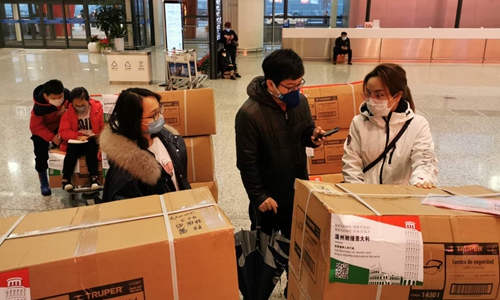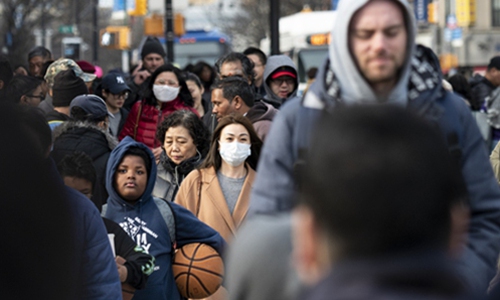HOME >> CHINA
China to back global virus fight with production boost
By GT staff reporters Source:Global Times Published: 2020/3/8 23:43:40 Last Updated: 2020/3/9 10:36:21
Stabilizer of global economy shifts from receiver of support to active contributor at frontline of COVID-19 battle

Wenzhou volunteers help transport donations related to COVID-19 for Italy. Photo: Courtesy of Blazing Youth
Global coronavirus cases have exceeded 100,000 over the weekend and spread to more than 100 countries and regions. Countries like Italy have begun adopting unprecedented large-scale city lockdown measures. Some Western media outlets and officials blamed China for being slowly responding to the outbreak, leading to a global crisis and exporting the virus to the world, despite that China's experiences of handling the coronavirus have been proven to be effective. In addition to battling virus, the country is quickly recovering as the world's factory, shifting from a receiver of support to an active contributor to the global virus fight, which has become more intensive due to recent case surges in Europe and the US.
In face of fast rise of confirmed cases, which has made several states declare a state of emergency, US President Donald Trump's administration, struggling to cope with a shortage of medical devices such as face masks, protective suits and test kits, lifted import restrictions by granting tariff relief for medical equipment. Meanwhile, demand for such equipment in European countries such as Italy and France keeps growing.
"China encourages domestic makers of medical goods and preventive supplies to meet growing overseas demand," Cao Xuejun, an official from the Ministry of Industry and Information Technology (MIIT), was quoted as saying in recent media reports. Meanwhile, the Ministry of Commerce said the country imposes no export bans on masks.
Currently, Chinese face mask manufacturers mainly produce to meet domestic supply amid the outbreak by motivating domestic enterprises, some of which, including automakers and smartphone manufacturers, have turned part of their main business to producing masks in a difficult time.
After more than a month of collective efforts in China, the country, also the world's manufacturing hub, is gradually recovering its production capacity, which also has been achieved through mobilization of national resources, including state-owned enterprises transferring production lines to making masks. Many countries have provided their support to China at the early stages of the outbreak. As long as the country is capable of meeting domestic demand, it would be ready to return the favor , according to Chinese officials.
As the world's largest producer of face masks, China has an annual output accounting for 50 percent global total and daily maximum outputs of more than 100 million, according to the MIIT. The country has also the most comprehensive supply chain including equipment and melt-blown fabric for producing masks, according to industry insiders.
Besides general masks, the daily manufacturing capacity of N95 masks has grown from about 200,000 to 1.6 million.
Shanghai Dragon Corp, a producer of underwear, which has been producing face masks since the beginning of the coronavirus outbreak, now produces millions of face masks every day. Although it is now mainly fulfilling domestic demand, it has been looking into overseas demand given the rapid spread at global level.
"We are trying to understand how many masks they need in Japan, South Korea, countries in Europe, and also the US, as well as factoring local import regulations so we can provide relevant testing procedures for future exports," Tony Tan, vice general manager at Shanghai Dragon Corp, told the Global Times over the weekend.
Some Chinese exporters, who have sales channels in Europe and the US, have been suggested to consider working with local factories that produce masks, protective suits and test kits to expand exports to overseas markets, Mei Xinyu, an expert close to China's commerce ministry, told the Global Times on Sunday.
"As China resumes work, Chinese factories could potentially become the world's 'arsenal' in fighting the coronavirus," Mei said.

People wear face masks as they walk down a street in Flushing area of Queens on Monday in New York City. Photo: AFP
However, authorities currently requisition surgical masks produced in China, which is treated as critical medical equipment for frontline doctors and nurses in the country. With more factories and companies restarting work, the demand for face masks in China would keep growing while fulfilling domestic demand remains the top priority, it takes time for the equipment to be exported to other countries, according to several mask producers contacted by the Global Times during the weekend.
The top priority remains to fulfill domestic need given China is still at critical stage of fighting the deadly disease, while the next step, as the world's factory, has to look into demand overseas, which also reflects the country's vision for a community with shared future for mankind.
The overall output of other medical equipment including disinfectant, hand sterilizers and medical alcohol in China can meet basic domestic demand, according to media reports, citing the MIIT. While the shortage of medical equipment has occurred in Europe, the daily output of Chinese disinfectant manufacturers is 1,579 tons, with another 1,908 tons in stock, the reports said.
Also, daily output of protective suits in China has now reached 500,000 units, marking a surge from less than 20,000 at the beginning of the epidemic, media reported on Friday.
China's lessons
The World Health Organization said on Saturday that China contributed $20 million to bolster the global fight against the COVID-19. Apart from donations, China has also offered valuable experience and lessons towards fighting the virus, as the WHO said the country is demonstrating that the viral spread can be slowed and negative impacts reduced through the use of universally applicable action.
Those actions include working across society to identify people who are sick, bringing them to care, following up on contacts, preparing hospitals and clinics to manage a surge in patients, and training healthcare workers.
To identify confirmed and suspected cases, some countries have been testing aggressively, even expanding the scope of testing to people with mild or no symptom that may mask viral transmission. Mass testing has also driven up demand for test kits, and to help meet the global demand, some Chinese companies are consulting overseas customers about actual demands, and preparing for an increase of exports, as of now China is fully able to fulfill domestic demand and more than 10 enterprises are capable of producing test kits.
For instance, a leading private genome sequencing company BGI Group told the Global Times in a recent interview that as of Monday, it has received orders for testing over 310,000 people from overseas and those shipments have arrived in 26 countries and regions.
A manager at a Shanghai-based test kit producing company said some test kit producers in Shanghai and Eastern China's Zhejiang Province have been considering exporting their products and his own company is applying for EU certificates while a local customer in Europe contacted them for consultations regarding business, considering China's massive output of testing kits.
"They asked us if we could provide test kits for 30,000 people. If we could help other virus-stricken countries, it's good, and it's also beneficial for us to export test kits made in China to the rest of the world," he said, preferring not to be identified.
As a stabilizer of the global economy, China plays an irreplaceable role in the global supply chain, especially when other countries have been struggling in meeting domestic demand. While China resumes work and stabilizes supply, it would only gradually resume supply to overseas markets in order to tackle the domestic supply-demand issue amid the outbreak.
"China was the country hit earliest by the epidemic and implemented measures to help itself which also provided a window of opportunity for the world," COVID-19 observer surnamed Huang said, noting that now the country strives to resume work with the aim of fighting for another window of opportunity.
As result, the world's factory should push forward with resumption of work firmly, aiming to gain more momentum for the world's economy, she said.
Global sharing
The recent WHO-China joint mission report calls China's vigorous public health measures toward COVID-19 probably the most "ambitious, agile and aggressive disease containment effort in history" by following the principle of early identification, and proper treatment with medical support.
Other experiences and lessons from China include authorities stepping in quickly, taking aggressive measures by cutting off transmission routes, building Fang Cang makeshift hospitals to prevent cluster infections and banning public gatherings. Countries like Italy began adopting such policies to shut down public places and schools while Iran has set up a makeshift hospital in Qom.
Although there are no specific antiviral or immune modulating agents (or recommended) to improve outcomes, according to the report, some measures that China has used in treating COVID-19 patients, especially those in critical conditions, are now studied and carefully examined in other countries, according to medical experts.
Some foreign countries have also started to develop plasma products to treat COVID-19 as China did before. For example, Takeda Pharmaceutical Company Limited based in Tokyo, Japan, announced on March 4 that it is developing a hyperimmune globulin to treat high-risk individuals with COVID-19.
Hyperimmune globulins are plasma derived-therapies that have previously been shown to be effective in the treatment of severe acute viral respiratory infections, a Beijing-based immunology expert told the Global Times on Sunday on the condition of anonymity.
Chinese companies are mixing recovered patients' plasma together and injecting them into current patients. It is an emergency measure due to the urgency of the epidemic but brings about problems and uncertainty as doctors can't decide what element is exactly working against COVID-19 and the risk of it containing other kind of pathogens exist, according to the expert.
"Instead, hyperimmune globulins therapies are made of the antibodies that work directly against the novel coronavirus. It is more direct and effective," he said, noting that more countries may join in exploring plasma products but probably would apply different methods and conduct more research on safety and effectiveness, which China has not had much time to do.
Some Chinese doctors at Wuhan Tongji hospital also shared their experiences in dealing with COVID-19 with their Italian counterparts via a teleconference during which Enrico Ammirati, a cardiologist at Niguarda Hospital in Milan, asked what kinds of masks and protective suits Chinese doctors are using in intensive units and in wards, as well as medical treatments recommended.
Today's Milan is also not well prepared for cutting off transmission routes and protecting medical staff, in addition to insufficient clinical treatment preparation for large influxes of patients, Zhou Ning, a Chinese doctor who took part in the conference call, told the Global Times on Sunday.
"The virus has no borders, which is a common enemy to humankind. We can only eradicate it by working together, sharing treatment experiences and enhancing global collaboration," he said.
Today's China, which has been familiar with the role it plays, understands clearly its own responsibilities and has the capability of contributing more to the world, according to analysts.
Posted in: SOCIETY